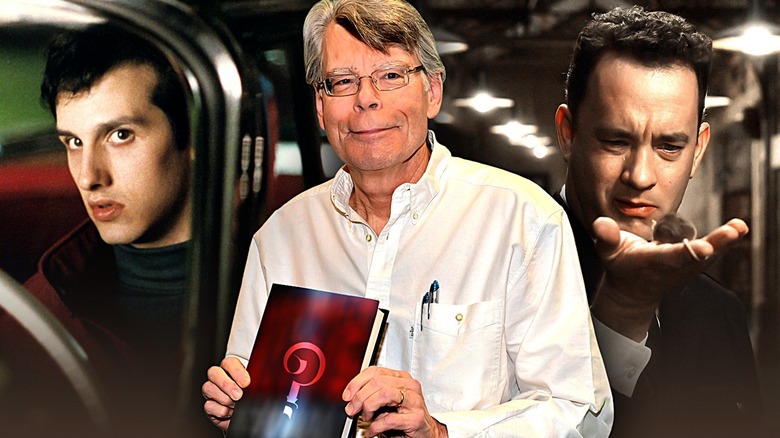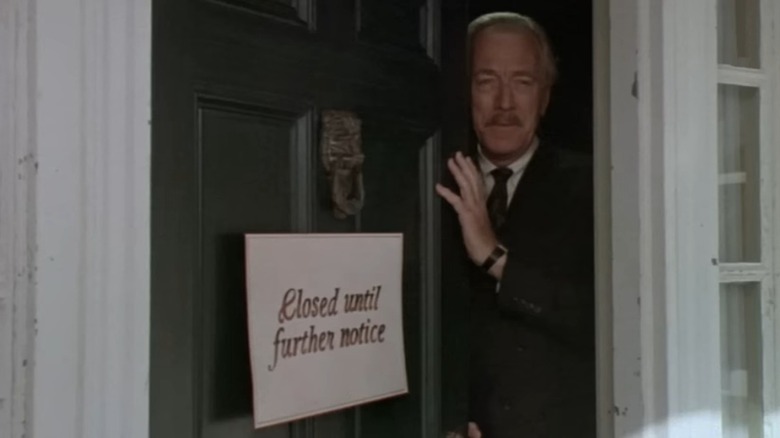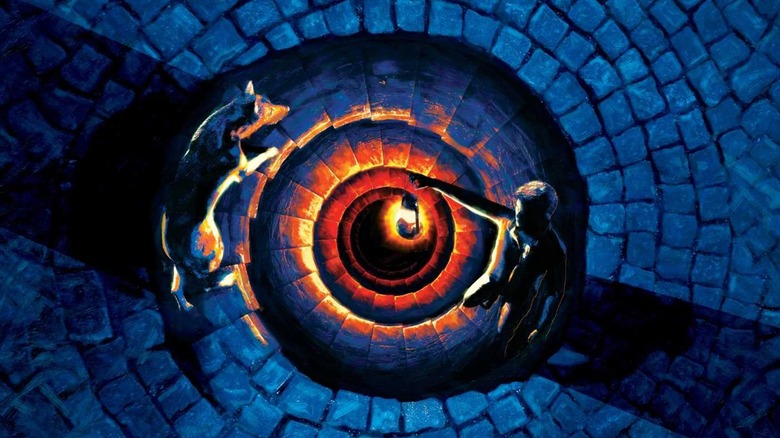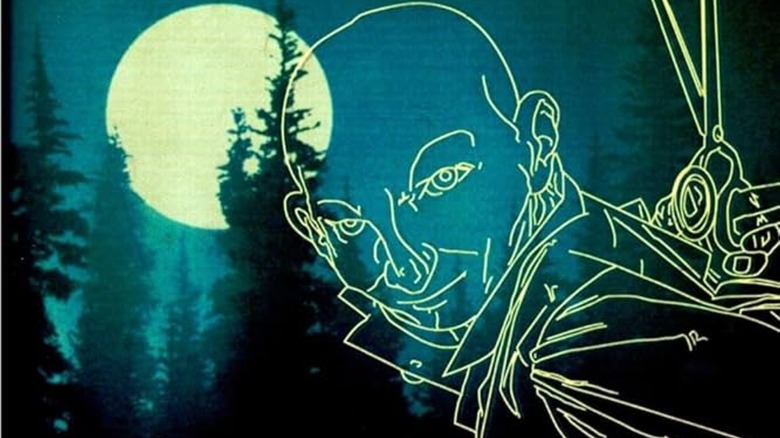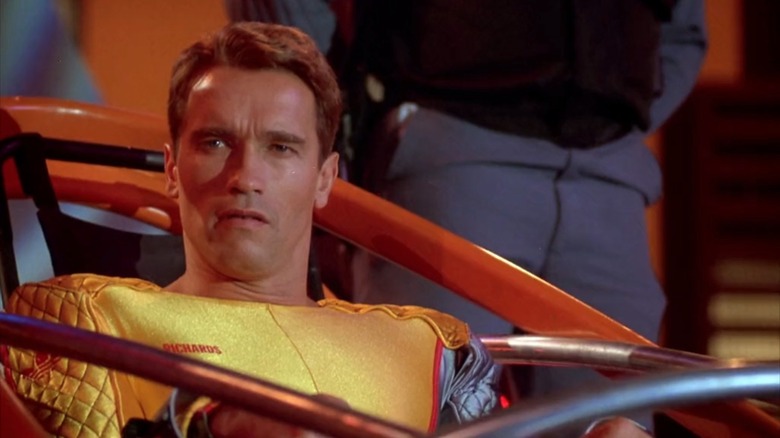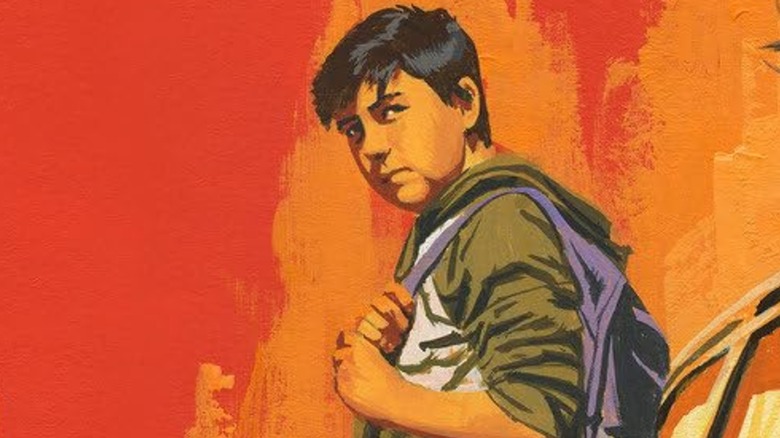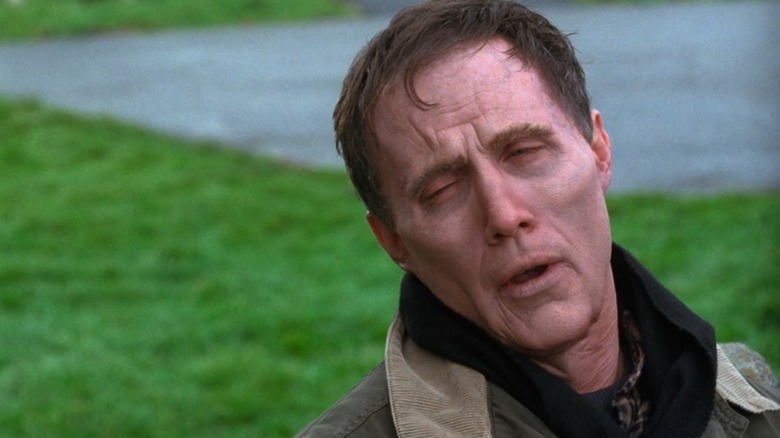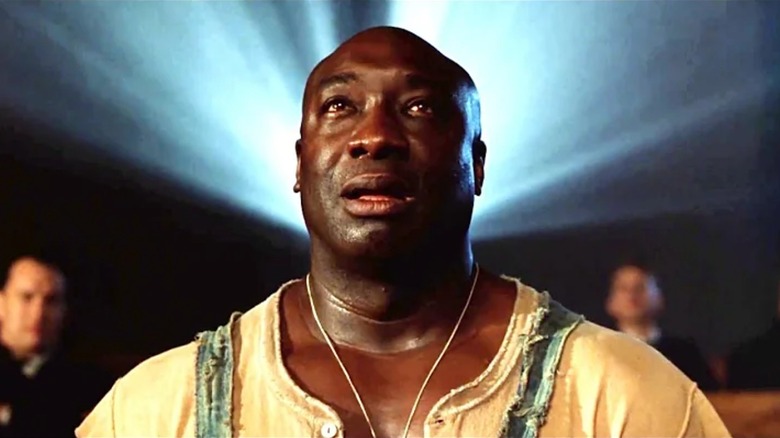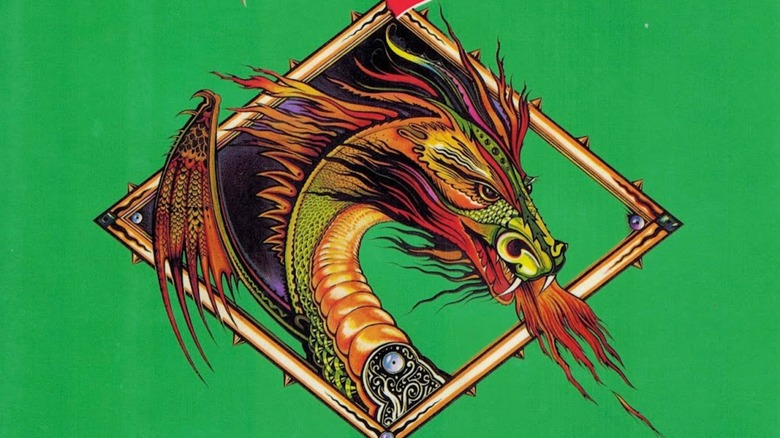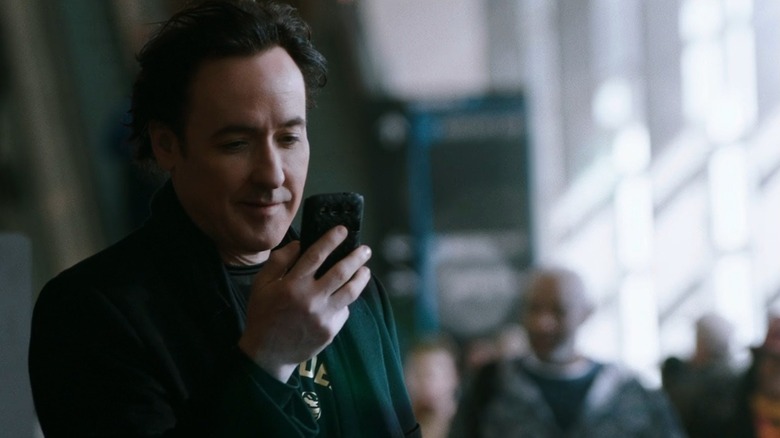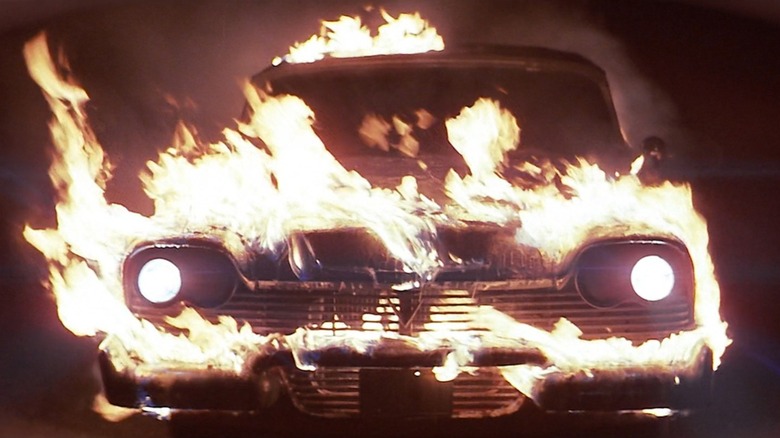10 Stephen King Books That Should Become TV Shows, Ranked
Adaptation is tricky. Change too much, and you've lost the original fans. Stick too closely to the source material, and you miss out on the fun part of adapting one medium into another. Stephen King adaptations in particular can be extra tricky. So much of what works about the writer's work is the specific, King-ian way it's written. For example, his idiosyncratic dialogue makes sense as a literary device; still, it can sometimes sound strange coming out of the mouths of living, breathing actors. His evils can also be quite symbol-heavy in a way that works better as literature; we can believe in a writer haunted by malevolent flocks of sparrows for the length of a horror novel, but the less said about the film version of "The Dark Half," the better.
The fun part about King is that he considers his oeuvre to be a playground for anyone. For decades, he offered budding filmmakers the rights to adapt his work for only a single dollar, though he shuttered the "Dollar Baby" program in 2023. While plenty of classic films came from King novels, there are many television shows taken from his books, too. Accordingly, there have been many different approaches; from the close Apple TV+ adaptation of "Lisey's Story" to the USA procedural vision of "The Dead Zone," anything goes.
With that in mind, here's how we would adapt 10 more Stephen King novels for TV, ranked by how much we'd like to watch the resulting show.
Needful Things
Okay, this one's easy. Any long-running episodic show needs an "engine" — an infinitely-repeatable format that will drive the story. If we were to adapt Stephen King's 1991 novel "Needful Things" as a television series, that engine would be the titular store itself. Run by the enigmatic weirdo Leland Gaunt, Needful Things is an antique shop that contains mystical items destined to find their eventual buyers. Gaunt loves to test the people who shop at his store, requiring pranks and trials as payment; the book's original plotline aside, that's a fun replicable format for a television show.
The 1993 film adaptation isn't great. Despite Max Von Sydow giving a committed performance as Leland Gaunt, "a scary store" is a tough premise to sell as a horror film. Instead, it could work well as a show with a similar tone to "Stranger Things" — a show that itself borrows liberally from King's ethos. A "Needful Things" show would be willing to dip into the mystical, yet would remain somewhat grounded in small-town life. After all, it's that juxtaposition that underlies so many King stories, which often feel as though something dangerous and unexplainable could erupt right out of the fabric of normal American life.
Fairy Tale
Stephen King is known for horror novels that scare adults, but he's also occasionally dabbled in material for younger audiences. His 2022 novel "Fairy Tale" isn't for children, exactly, but it's about a teenager who travels to a strange and unfamiliar realm. It's the kind of story that would have done very well in the post-"Hunger Games" 2010s, had it been adapted into a film.
As it is now, it might work better as a streaming show, the kind of teenage fantasy fare that Netflix loves to make (and then unfortunately cancel). The book is relatively episodic anyway, taking the teen from location to location in a way that would lend itself well to episode breaks.
"Fairy Tale" tells the tale of Charlie Reade, a teenager who agrees to look after his neighbor's dog. When the neighbor passes away, Charlie learns that he was over 100 years old, and that he had a portal in his shed to a place called Empis. Charlie travels to the magical realm and joins a battle for the survival of its people, who are under siege. There are evil overlords, horrifying creatures, combat battles, a sundial, and even mystical prophecies; in other words, there's a wealth of worldbuilding material that could be explored on a television show.
Insomnia
In 2021, Stephen King told The Associated Press that he doesn't think of himself as purely a horror writer. "My view has always been you can call me whatever you want as long as the checks don't bounce," he joked, before clarifying. "My idea is to tell a good story," he said, "and if it crosses some lines and it doesn't fit one particular genre, that's good." That might be why so many King books have a crime element; he's a noted fan of detective fiction. In other words, scary though his books may be, most of them also contain something of a mystery. As a result, lots of King stories lend themselves well to being adapted as procedurals in the vein of "The Dead Zone" on USA.
"Insomnia" is one of them. It's about Ralph Roberts, an older man who has trouble sleeping. As he succumbs to his insomnia, he realizes that he can see auras, perceiving secrets about people thanks to the colorful haze that surrounds them. He also becomes aware of an ancient conflict between "The Purpose" and "The Random," personified by "little bald doctors" that he sees wandering the world carrying scissors. Adapting "Insomnia" as a USA-style procedural would put Ralph to work using his aura abilities to solve crimes; The Purpose and The Random would provide an ongoing storyline, contrasted with the more case-of-the-week stuff.
The Running Man
Arnold Schwarzenegger starred in a 1987 film version of "The Running Man," and Edgar Wright has directed a new adaptation starring Glen Powell. This is one of those Stephen King novels that people love to bring up as having predicted the future; after all, it's about our modern obsession with reality television, written before that was a phrase. It's about a man who agrees to participate in a televised game show in order to pay his family's debts, now a common motivation for signing up for shows like "Big Brother." In "The Running Man," however, contestants are hunted for sport. The longer they avoid being killed by the show's assassins, the more money their families win.
The novel is even set in 2025 (while the film version covers 2017 to 2019). So ... given that the story reflects real life ... why haven't we adapted the book as an actual reality show? Sure, we're not ready for actual murder on television yet, and nor should we be. Still, "The Running Man" is basically a giant game of hide-and-seek; contestants are set loose in Los Angeles, and fans track their progress by alerting the show whenever they're spotted. After all, everyone has cell phones now; we live in even more of a surveillance state than King could have guessed. It's downright surprising that no one has yet worked out a way to turn giant audience-participation hide-and-seek into a competition show.
Later
Stephen King's 2021 novel "Later" is his third collaboration with Hard Case Crime. The book was released primarily in paperback and may seem like a minor work in the King canon, but it's one of his better late-period novels — a purely fun, lightly edgy potboiler that doesn't aspire to be anything more than that. It's about a teenager named Jamie Conklin, a kid who has a special ability lifted right out of "The Sixth Sense": He sees dead people. Because this is a crime book, he uses that ability to track down a mad bomber who's terrorizing the city, talking to various ghosts he encounters along the way.
That's a fun engine for a young adult television show. The first season could adapt the novel closely, following Jamie the Teen Detective as he encounters numerous ghosts connected to the bombing case. Any potential future seasons could develop their own, original mysteries, giving Jamie more crimes to solve and more specters to converse with. After all, he's a hard-headed kid, capable of striking out on his own ... as all the best teen TV show protagonists are. The "Later" show would be like if Joan from "Joan of Arcadia" solved crimes, or if Veronica Mars solved crimes by talking to dead people. See? It sells itself!
Thinner
Stephen King's 1984 novel "Thinner" was originally published under his pseudonym, Richard Bachman. The book is classic Stephen King, however, to the point where this is the novel that made people finally realize King and Bachman were one and the same. It's about an overweight lawyer named Billy, who accidentally runs over an old Romani woman late at night, leading her father to curse him with one word: "Thinner." Soon, Billy sheds pounds faster than he can believe it, positively wasting away.
The 1996 film adaptation isn't great, so it's not like a new adaptation would besmirch some untouchable classic. Instead, turning the book into a television show would allow more time for the story to breathe, to really show Billy's transformation and play with how quickly he morphs into a gaunt shell of his former self. Plus, in the age of Ozempic, the framework of "Thinner" could be an interesting opportunity to explore how beauty standards have changed in the decades since the book was written. Massive, rapid weight loss is no longer as rare as it once was, so how might a character convince those around him that he's been cursed?
In addition, a new adaptation of "Thinner" would allow King to correct the book's depiction of Romani people, which, to be honest, is rather racist. The longer form of a miniseries would potentially allow us to explore their stories, too, digging into their grief over what Billy did to their family.
The Green Mile
Frank Darabont's 1999 film version of "The Green Mile" is very good. Michael Clarke Duncan gives an all-time-great performance as John Coffey, a gentle man on death row who has the power to heal, and Tom Hanks is excellent too as Paul Edgecomb, the man tasked with executing him. The movie is more than three hours long, however, leading reviewers in the likes of Newsweek and on the BBC to complain about the runtime.
These days, no one seems to mind sitting down to binge a multi-hour miniseries. And, hey, wouldn't you know it, "The Green Mile" was originally published as a serial novel. In 1996, King released the book in six parts, each sold as a small paperback; together, over a period of six months, they added up to one novel. Each part has its own small arc and is satisfying in its own way, while still making you want to pick up the next volume in the story.
That sounds like a storytelling format that would lend itself very well to a television miniseries adaptation. Six episodes — one for each chapbook — would really let audiences dig in to the goings-on at Cold Mountain Penitentiary, highlighting memorable characters like Wild Bill and Dean Stanton. It would even allow for some formally stylistic moments; imagine an episode comprised solely of the grueling, methodical description of an electric-chair execution that occupies much of the second part.
The Eyes of the Dragon
Mike Flanagan is working on finally bringing Stephen King's "Dark Tower" epic to the small screen. King himself is excited for the "Dark Tower" show, explaining to Dread Central, "When you're on the path of the beam, it's an incredibly long journey. But that doesn't mean we're not going forward with it. It just means it takes time."
While they're at it, why not adapt "Eyes of the Dragon" too? Every network has been looking for "the next 'Game of Thrones'" for more than a decade at this point, so a companion piece to the "Dark Tower" saga might be a good place to start. The book is about a medieval kingdom called Delain, and it focuses on a plot by Flagg, the king's jester, to kill the king.
Stephen King obsessives will recognize that name as Randall Flagg, the primary antagonist of "The Stand" and the "Dark Tower" books; he's a trickster who exists at many different times under many disguises. Flagg has shown up on-screen several times recently; he was portrayed by Matthew McConaughey in the ill-fated 2017 "Dark Tower" film, and by Alexander Skarsgård in CBS' adaptation of "The Stand." Presumably, he'll be part of Flanagan's "Dark Tower" show, too; imagine if the same actor plays him in a concurrently-running "Eyes of the Dragon" miniseries. "The Dark Tower" is one of the great literary crossovers, so it would be fun to bring that same energy to television.
Cell
Cell phones have rapidly transformed human society, as Stephen King picked up on in his 2006 novel "Cell." The book is about a mysterious signal that transforms anyone using a cell phone into zombies. (Hey, we never said the metaphor was subtle.) More interesting, however, is the behavior of the zombies once they've been transformed. They move in flocks, behaving as a sort of hive mind, eventually seeming to follow the direction of a zombie the survivors call "the Raggedy Man."
You may have noticed that 2006 was the year before the introduction of the iPhone. The 2016 film adaptation has the characters using smartphones, but it trades a lot of the novel's strange mysticism for standard action-horror tropes, losing a lot of what makes the book so interesting. A longer television adaptation could allow us to dig into the budding society of the "phoners," letting us see more gradually how their behavior changes over time. We know the audience is there for longform zombie TV, as "The Walking Dead" and its endless spinoffs prove.
Plus, the story is ever more relevant, especially in light of global political events. When King initially thought cell phones were turning people into mindless zombies in 2006, he had no idea of the effect social media would have on the population. A flock of people who let signals from their cell phone infect their mind, so they now blindly follow a leader into violence ... do we have to spell it out?
Christine
John Carpenter's 1983 film adaptation of "Christine" is already one of the best Stephen King movies; you can't beat that score, and the movie manages to make an evil car into something legitimately beguiling and strange. But wouldn't it have been fun if the film got one of those cheesy Saturday morning cartoon spinoffs? If we can turn '80s films like "Ghostbusters" and "RoboCop" into cartoons — not to mention the "Beetlejuice" show, where the undead pervert and teenage Lydia Deetz are best buddies — then why not "Christine?"
Picture it: it's Saturday morning and you're 10 years old. You wake up before the rest of your family, pour yourself a big bowl of sugary breakfast cereal, and sit down in front of the television just in time for your favorite cartoon. It's about a nerdy boy not unlike yourself; he's a few years older than you, however, and he's got a car.
Sure, Christine the Car might be "evil" — she has a tendency to burst into flame, after all — but she helps protect her owner from bullies. What kid wouldn't want that? Each week, Arnie and Christine tool off around the country on an adventure. Each week, they run afoul of some local bad guys, often other teenagers who make fun of Arnie for his acne. When he drives Christine, Arnie's the coolest cat around, and Christine can't let that bullying stand. Boy, you sure can't wait to have a car of your own someday. That's the power of "Christine."
